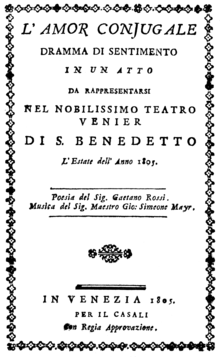L'amor coniugale
L'amor coniugale (Conjugal Love) is an opera in one act by Simon Mayr set to an Italian libretto by Gaetano Rossi. It premiered at Padua's Teatro Nuovo on 26 July 1805.

Background and performance history
Like Beethoven's Fidelio, the libretto of L'amor coniugale is based on Jean-Nicolas Bouilly's French libretto for Pierre Gaveaux's 1798 opera Léonore, ou l'amour conjugal.[1] Unlike Fidelio which focuses on the struggle for political liberty, Mayr's opera, also known as Il custode di buon cuore (The Good-hearted Jailer) and described in its libretto as a farsa sentimentale, focuses more on the interpersonal relationships between the protagonists and contains comic elements.[2] Rossi condensed Bouilly's two-act libretto into one act containing 19 scenes and changed the setting from the Napoleonic Wars to 17th century Poland.
L'amor coniugale premiered at the Teatro Nuovo in Padua on 26 July 1805 in a double bill with the premiere of Pietro Carlo Guglielmi's La donna di spirito. It was then performed the following September at the Teatro San Benedetto in Venice. Although rarely performed now, it was revived at the Teatro Donizetti in Bergamo in November 1984 conducted by Bruno Moretti and in Germany at the 2004 Rossini in Wildbad Festival conducted by Christopher Franklin. The Wildbad performance used a revised score by Arrigo Gazzaniga and was issued by the Naxos Records label.
Roles
| Role | Voice type | Premiere cast[3] 26 July 1805 |
|---|---|---|
| Zeliska, in disguise, Malvino | soprano | Margherita Chabrand |
| Amorveno, Zeliska's imprisoned husband | tenor | Saverio Monelli |
| Peters, the jailer | bass | Carlo Angrisani |
| Floreska, Peters' daughter | soprano | Clementina Veglia |
| Moroski, the governor | bass | Natale Veglia |
| Ardelao, Amorveno's brother | tenor | Carlo Merusi |
Recordings
- Mayr: L'amor coniugale – live recording from the 2004 Rossini festival in Wildbad, Germany, with Christopher Franklin conducting the Württemberg Philharmonic Orchestra. Label: Naxos Records 8660198
References
- Bouilly's libretto also formed the basis for Paer's Leonora ossia L'amor coniugale which premiered at the Dresden Hoftheater in 1804
- Lindner, Thomas, Liner notes: L'amor coniugale (English version by Neil Coleman), Naxos Records 8660198.
- Casaglia, Gherardo (2005)."L´amor coniugale, 26 July 1805". L'Almanacco di Gherardo Casaglia (in Italian).
External links
- L'amor coniugale (Mayr): Scores at the International Music Score Library Project (IMSLP)
- Gaetano Rossi's libretto for L'amor coniugale
- Libretto by Jean-Nicolas Bouilly for Léonore, ou l'amour conjugal (on which L'amor coniugale is based)